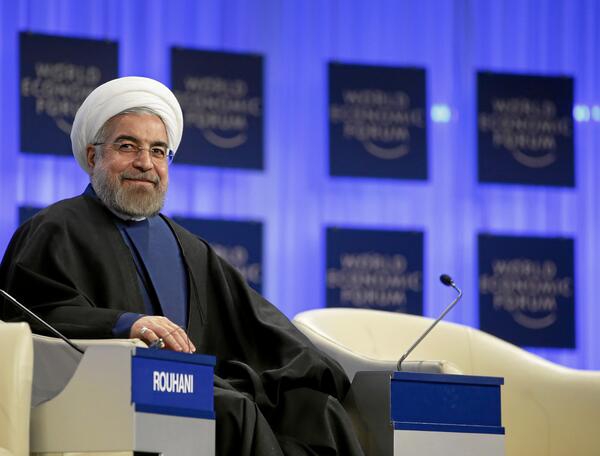 (Reuters) -�Iran�is negotiating with the United States as part of a "constructive engagement" with the world community and wants Washington to back up its words with actions, President Hassan Rouhani said on Thursday.
(Reuters) -�Iran�is negotiating with the United States as part of a "constructive engagement" with the world community and wants Washington to back up its words with actions, President Hassan Rouhani said on Thursday.Speaking at the World Economic Forum in�Davos, the pragmatic president who took office last August also said relations with Europe were being normalised now that an interim nuclear accord was being implemented.
Addressing about 2,500 global business and political leaders, he invited European companies, especially major energy groups, to seize economic opportunities in Iran.
"The Islamic Republic of Iran is prepared to engage in constructive cooperation for promoting global energy security, drawing on its vast oil and gas resources," he said.
Underscoring that pitch, he held a private meeting with oil and gas executives at a hotel in the Swiss resort before his speech.
A deal with six major powers including the United States to restrict Iran's nuclear programme in exchange for a partial easing of economic sanctions came into force this week.
However, most sanctions, including a severe squeeze on access to the international financial system, remain in force and the United States has stressed Western companies should not regard Iran as "open for business".
Rouhani promised to pursue a foreign policy of "prudence and moderation" to revive the battered economy.
He called for cooperation with all Iran's neighbours but did not mention Gulf rival�Saudi Arabia�by name and refused, when pressed twice, to include Israel among states with which Iran sought friendly relations.
Tehran wanted friendship and cooperation with "all the countries which the Islamic Republic of Iran has recognised", he said.
Rouhani repeated Iran's standard pledge not to seek nuclear weapons and said Tehran was willing to accept all safeguards and inspections of the U.N. nuclear agency, provided it was not subjected to "discrimination". Western countries believe the atomic effort is aimed at developing a military capability.
"We never sought and will never seek nuclear weapons," the president said. "I declare that a nuclear weapon has no place in our security strategy."
Rouhani said Iran had a strong will to clinch a permanent settlement to the nuclear issue while the six-month interim accord is in force, but he said other countries might succumb to "pressure from other parties" - a veiled reference to Israel - not to reach a deal.
In a foretaste of tough negotiations on a long-term agreement, he said: "Iran will not accept any obstacles to its scientific progress."
CONSTRUCTIVE ENGAGEMENT
The United States and other Western powers want Tehran to end high-grade uranium enrichment and shut down a heavy-water reactor capable of producing plutonium nuclear fuel under any permanent settlement. Iran rejects these steps.
Rouhani broke no new diplomatic ground in his speech, the second phase of his opening to the international community after his charm offensive took the United Nations by storm last September in New York.
"I hereby announce that one of the theoretical and practical priorities of my government is constructive engagement with the world," he said.
With Saudi Prince Turki al-Faisal, a former intelligence chief and ambassador to the United States, sitting in the audience, Rouhani said Iran sought cooperation "with the littoral states of the Persian Gulf", but he did not name Saudi Arabia, which has expressed concern about the interim nuclear deal.
In a clear swipe at Riyadh and Qatar, he renewed criticism of countries he did not name which he said were supporting terrorism in�Syria, saying this would rebound on them at home.
Iran strongly backs Syrian President Bashar al-Assad and was shut out of Wednesday's U.N.-sponsored peace conference on Syria in Montreux, Switzerland, because of its refusal to endorse a framework for a transition from his rule.
Rouhani was due to meet journalists and other business leaders before leaving Davos later on Thursday.
By Reuters
The Iran Project is not responsible for the content of quoted articles.











